by Naomi L. | January 30, 2017 | Blog, Word of the Week |
Word: iconoclast
Pronunciation: ai-KAH-nə-klast
Part of Speech: noun
Definition: a person who attacks cherished beliefs or institutions
Source: Oxford Dictionaries
Here’s a word that’s made it on many vocabulary prep lists, or at least the ones I’ve studied. I remember always being intrigued by this word when I came across it in my flashcard stacks because it sounded so unusual and poetic. Of course, its definition isn’t quite as lyrical as its tone might suggest; I’d be interested in reading about an “iconoclast”, but not in being one!
An “iconoclast” is someone who criticizes or attacks cherished institutions or beliefs. The word arose in the mid 17th century in the sense “destroyer of religious figures” and comes from the Greek noun eikonoklástēs, meaning “breaker of images”. This noun in turn comprises the noun eikṓn “figure” and the verb klázō “to break”.
Aside from its primary definition, “iconoclast” can also refer to “a destroyer of images used in religious worship”. Oxford Dictionaries’ entry lists two historical examples as sub-definitions: 1) “a supporter of the 8th- and 9th-century movement in the Byzantine Church that sought to abolish the veneration of icons and other religious images”, and 2) “a Puritan of the 16th or 17th century”. If you’ve created a character who attacks or criticizes certain religious beliefs, institutions, or images, you’re definitely writing an “iconoclast” into your stories!
What are your thoughts on this word? Any suggestions for future “Word of the Week” featured words?
by Naomi L. | January 25, 2017 | Blog, Creative Writing, Off The Bookshelf |
Welcome back to my Off The Bookshelf segment! It’s been almost a year since I’ve written a book review for my blog, which is a shame since I do love recommending my favorite novels. The good news is that I read several new books last year and plan to read even more this year, so I’ll have plenty of material to work with in 2017!
So today, I’d like to start off this year’s reviews with my favorite novel from my 2016 list: Pride and Prejudice by Jane Austen!
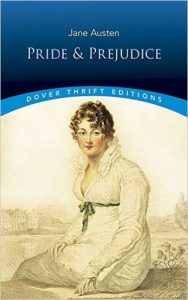
Pride and Prejudice, by Jane Austen
Summary
First printed in 1813, Pride and Prejudice is Jane Austen’s second published novel and one of the most beloved works in English literature. The novel follows the story of Elizabeth Bennet, an exceptionally clever young woman and the second of a country gentleman’s five daughters, as she navigates issues of manners, morality, education, and romance in the landed gentry society of the British Regency. Among her greatest challenges is dealing with Mr. Darcy, a gentleman with great wealth and even greater pride with whom she repeatedly clashes. As their relationship progresses, both Elizabeth and Mr. Darcy come to learn that first impressions are often misleading, and that they must overcome their pride and their prejudices before the story can reach its happy conclusion.
Review
Every so often, you come across a story so well written, so absolutely brilliant that it draws you in from the first sentence and keeps you hooked to the very last page. Such was my experience with Pride and Prejudice, a literary masterpiece from a brilliant mind of the turn of the 19th century. Jane Austen’s novel is still beloved by many readers today, and with good reason: it’s a comedy that covers some of humanity’s most relatable issues – love, marriage, etiquette, wealth, and morals – all from the perspective of an astute young heroine who challenges and overcomes the obstacles of her social position to achieve her happy ending.
Naturally, a central theme in Elizabeth’s story is the difference between the superficial and the indispensable, as well as the emotional development that comes with learning to distinguish the two. After all, there’s a reason the novel was originally titled First Impressions. In the beginning, the protagonist has a habit of forming her opinions of people immediately and consolidating those opinions through selective observation, a practice she believes is a credit to her intelligence. As a result, she dislikes Mr. Darcy from the day she meets him and grows to despise him the more time she spends with him, while Mr. Wickham earns her favor instantly with his charm and apparent good breeding. Halfway through the story, however, Elizabeth discovers that her preconceptions of both gentlemen were misplaced, proving that appearance isn’t always the best indicator of worth. The same lesson is learned by Mr. Darcy, who initially believes his proud behavior to be justified but is promptly put in his place by a woman he once thought was beneath him. Fortunately, both these characters prove mature enough to shed their most prominent flaws in favor of the romance that will make them “the happiest couple in the world”. First impressions are powerful, but thankfully they don’t always stick!
Another of my favorite themes of the book is the only-too-familiar contrast between proper behavior and real character. Throughout the narrative, it’s made apparent that while everyone behaves politely, some characters only do so to maintain a respectable place in high society while others are genuinely good at heart. A notable example comes up during a scene in Netherfield: when Elizabeth arrives at the Bingleys’ estate to take care of her sister Jane, who has fallen ill, all three of her hosts smile and treat her with the utmost kindness and hospitality. The second she leaves the room, however, Caroline and Louisa start criticizing Elizabeth’s dirty clothes while Charles remarks on how much she must love her sister to have walked so far on muddy roads just to see her. Even among siblings, people can vary greatly in character, but good manners are universal!
Austen was always an expert at implementing irony and satire in her writing, and Pride and Prejudice is no exception. Being witty and lively by nature, much of Elizabeth’s perspective includes hints of criticism about her reality: the influence of her family’s low income on their social standing (e.g. Jane’s failed friendship with Caroline Bingley), the excessive pride of some of her wealthier acquaintances (e.g. the unintentional insults in Mr. Darcy’s proposal), marriage as a requirement for women to secure a respectable position in society (e.g. Charlotte Lucas agreeing to marry Mr. Collins, a man she doesn’t love). And while the author didn’t necessarily discourage the following of such social rules in her novels, she did present them in a comical light that at least called these societal standards into question.
Overall, Pride and Prejudice is a fantastic novel that I would highly recommend to anyone who enjoys clever insights into human thoughts and behavior. For romantics and realists alike, this story has something for everyone and will surely continue to captivate audiences for generations, broadening our perceptions of the societal norms by which we live. To anyone who loves literature, it’s certainly an enlightening and delightfully entertaining read!
Inspiration
Ms. Austen’s beloved novel is one of those classic pieces of fiction that remains relevant long after its time. Though the story takes place in the early 19th century, its themes of social conduct, proper etiquette, and first impressions are still universal in the modern world. Whenever I need inspiration for character development, I know I can turn to an Austen novel for insight on general behavior and the restrictions of polite society to better understand how people think and function in everyday life. Basically, Pride and Prejudice is an excellent example of a point I’ve made in the past: that historical fiction can show us the elements of human nature that don’t change over time.
If you’re a historical fiction author or a writer of stories about the human condition, Pride and Prejudice will definitely be a great source of inspiration for your characters, whether they’re 19th-century country folk, 21st-century city dwellers, or anything in between. The greatest stories are those that explore what it means to be human, which makes it no surprise that this novel always appears near the top of best-books-ever-written lists. So if you haven’t yet, I strongly urge you to pick up a copy of Pride and Prejudice and see for yourself what a delightful read it truly is. You may find to your amazement that despite having lived so long ago, Jane Austen can still teach you a thing or two about the ironies of your economic and social reality!
by Naomi L. | January 23, 2017 | Blog, Word of the Week |
Word: excoriate
Pronunciation: ik-SKO-ree-ayt / ek-SKO-ree-ayt
Part of Speech: verb
Definition: censure or criticize severely
Source: Oxford Dictionaries
Have you ever witnessed someone say or do something so ridiculously stupid that to “criticize” them just wasn’t enough? Maybe you feel you’ve overused words like “censure” and “condemn” in your writing and find yourself looking for a fresh alternative. If so, you’re in luck, because just this month I learned a new word that addressed this same issue for me, a word that instantly caught my eye as an interesting potential addition to my vocabulary list. When people act far too dully for ordinary criticism, it may be time to “excoriate” them instead!
To “excoriate” someone is to criticize or censure them severely. The word arose in late Middle English and comes from the Latin verb excoriare, meaning “to skin”. This verb in turn consists of the preposition ex “out of” and the noun corium “hide”.
Though I wasn’t yet familiar with “excoriate”, the tone of the word and the context in which I saw it made it easy to understand from the moment I first read it. It’s worth noting that “excoriate” has a more formal connotation that “criticize”, so you may want to spare it for narrative writing over dialogue. If your characters tend to censure each other in the sharpest manner possible, “excoriate” could be an excellent addition to your vocabulary list!
What are your thoughts on this word? Any suggestions for future “Word of the Week” featured words?
by Naomi L. | January 20, 2017 | J.C. Wolfe's Writing, Short Stories |
As the creature reared its massive ugly head, we all trembled. We had never seen anything like it. Where had it come from? What was it capable of? And why hadn’t we seen it coming? The answers were more terrifying than we dared to imagine.
The sorcerer smiled thinly at the crowd from the platform. His beast towered behind him, held fast to the ground by a massive chain that rattled whenever it roared. We shuddered to think its master could unleash it on us at any moment.
“My friends”, the magician cried as the audience grew quiet, “I am honored to be your champion. My beloved pet and I will be proud to serve as your defenders in this new age of peace and prosperity. But trust me, we could not have succeeded in ending this terrible reign of oppression without your overwhelming support, courage, and spirit. We have all won a grand victory today. This day will be remembered for centuries as the day we ended tyranny, the day we crushed the bloodsucking rats who thought they could steal your freedom and leech off your hard labor forever.”
“He’s talking about us”, I heard one of my friends mutter next to me through the thunderous applause. It was true: every right we had worked for over the past decade, every step we had taken in the name of justice, everything we had thought was for the good of the people, was now being undone before our eyes because it was only ever good enough for us. It was a cruel reminder of how fragile our world really was; the harder you fought for change, the more afraid and resistant people became.
“This is your time, my friends”, the sorcerer continued. The cold look in his eyes as he addressed the people sent a chill down my spine. “It’s time you took back what is rightfully yours. Together, we can return this land to the thriving state it once was. Things are going to be very different from now on.”
The rows of people around the platform cheered, while those of us huddled in the back of the crowd remained more lost and confused than we had ever been in recent memory. This wasn’t supposed to happen. The queen and her army were supposed to save us, to fight the dark forces and vanquish the evil into oblivion. We were supposed to be celebrating today. Instead, she had been defeated and most of us were left cowering like frightened children in the wake of the revolution. What had gone so wrong?
Some of us blamed the town criers for carrying false news and exaggerated reports of the army’s successes. Some of us blamed the queen’s advisors for devising a military strategy that ultimately failed. Some of us blamed the queen herself for overestimating her own power and placing her trust in the wrong people. And some of us were reduced to blaming each other for taking our beloved leaders for granted and not doing our part to defend the progress they had made possible.
In the end, it didn’t matter. We were all to blame for this travesty, we knew that, and now it was too late to stop the storm. History had already been changed. So now what?
“He’s right.”
My gaze fixed on the stage, I saw the others turning to face me from the corner of my eye. It might have been the weight of my words that made them stare, or perhaps they were just surprised that I had spoken for the first time in hours.
“What are you saying?” said one of my companions, her voice small and nervous. I shook my head.
“Things are going to be different. This is just the beginning. The queen is gone, the army is scattered, even the scholars are starting to disappear. There’s nobody left to protect us… so we have to protect ourselves. No running, no hiding, no pretending that everything is normal. It’s time to organize. It’s time to fight.”
“But…” another friend stammered, “how are we supposed to fight them when they have that… thing on their side? It’ll kill us as soon as they know we’re coming!”
“And who’s going to see us coming?” I said, turning to the group at last. It was the first time I’d smiled in weeks. “We’re rats, remember?”
The monster roared again, flaming locks of fur flying as it convulsed like a raging madman. Somehow that horrible sound made the crowd cheer even louder. Stoic as I planned to be for the foreseeable future, I turned my back on the holes in the wall and jumped down to walk away into the darkening streets. I didn’t have to look back to know my friends were only a few steps behind, nor that nobody else saw us leave. They never even knew we were there.
We still remember it as our darkest day. And though none of us knew exactly what to say, to think, to feel anymore, of one thing we were absolutely certain: these were going to be the longest and hardest fought years of our lives.
by Naomi L. | January 18, 2017 | Blog, Creative Writing |
Welcome to the second part of my top ten list of books to read in 2017! Looks like another Goodreads reading challenge is on the horizon! If you haven’t yet, feel free to check out the first half of my list from last week. Otherwise, enjoy!
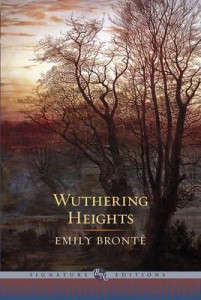 6) Wuthering Heights by Emily Brontë
6) Wuthering Heights by Emily Brontë
Here’s another selection from last year that I didn’t get around to reading in 2016. Hopefully I’ll have better luck with it this year! Wuthering Heights has been on my to-read list for a while, even before I received a copy as a gift some years ago. With quite a few dystopian novels making it on my list for 2017, I’m sure a break for historical fiction will be more than welcome!
 7) The Martian by Andy Weir
7) The Martian by Andy Weir
After indulging in so many historical novels last year, it’s time I start picking up more science fiction. After watching this movie in 2015 and loving it, I decided to read the book on which it was based, though it would still be a while before I could get my hands on a copy. Now that I’m starting a new chapter of my life and should have a little more free time, I look forward to adding The Martian to my list of reads for 2017!
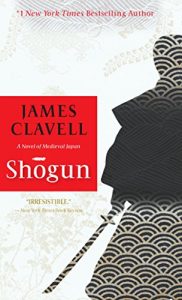 8) Shogun by James Clavell
8) Shogun by James Clavell
This book was recommended to me by my parents, both of whom read it a long time ago and loved it. The fact that they want me to pick it up is a sign of how well they know me, because one of my greatest obsessions in life has long been the culture and history of Japan! Maybe it’s the fact that I’m part Japanese myself, but something about the country just draws me in and intrigues me to no end. It’s a long read for sure, but if I find the time this year, I’d love to give Shogun a try!
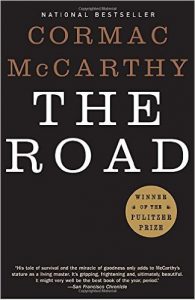 9) The Road by Cormac McCarthy
9) The Road by Cormac McCarthy
Here’s another selection that made it onto my list by recommendation, in this case by my boyfriend. He read this book a while back and really enjoyed it, though he did warn me it would be kind of depressing. Still, the author’s unique style of storytelling stands out and will certainly make The Road an interesting choice for my 2017 reads!
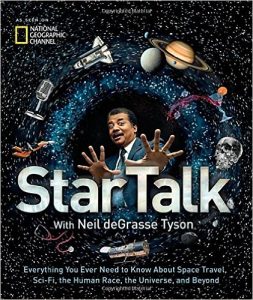 10) StarTalk, edited by Neil deGrasse Tyson, Jeffrey Simons, and Charles Liu
10) StarTalk, edited by Neil deGrasse Tyson, Jeffrey Simons, and Charles Liu
Fully titled StarTalk: Everything You Ever Need to Know About Space Travel, Sci-Fi, the Human Race, the Universe, and Beyond, this book is essentially a written adaptation of Neil deGrasse Tyson’s popular podcast and National Geographic TV series, full of scientific questions and answers about the Universe as we know (or don’t know) it. I know it’s not like the other selections on this list, but similar to last year’s format, I’d like to include at least one nonfiction book in my 2017 lineup. I gave this book as a Christmas present to my boyfriend in 2016, though it was really a gift for both of us as I have every intention of borrowing it! I’ve always been fascinated with science in general and space in particular, so StarTalk is definitely a book I’ll enjoy reading this year!
This concludes my list of books to read in 2017! I hope you enjoyed it, and as always, thanks for reading!
What about you? Any books you’d like to read this year? What other goals have you set for 2017?









Recent Comments